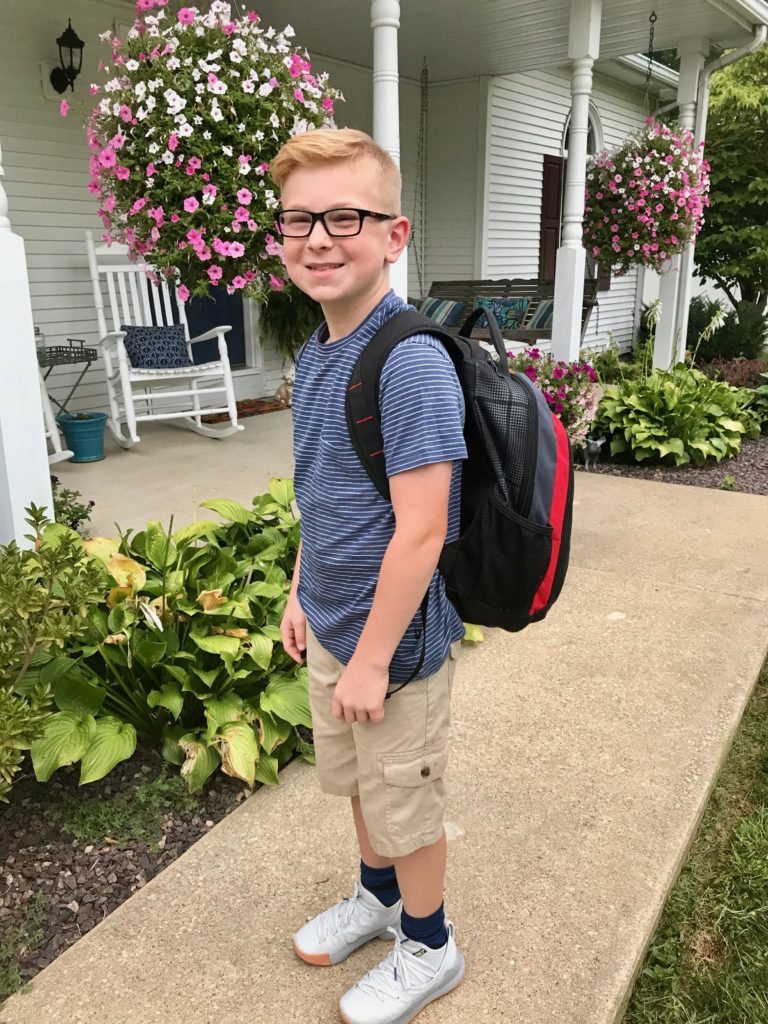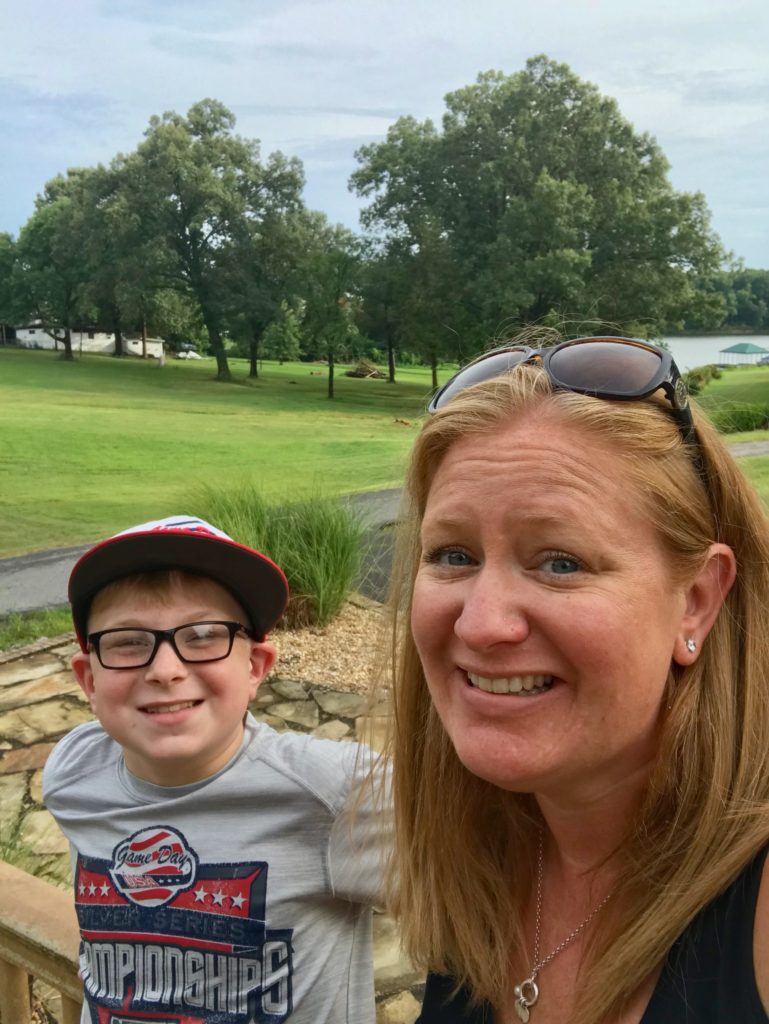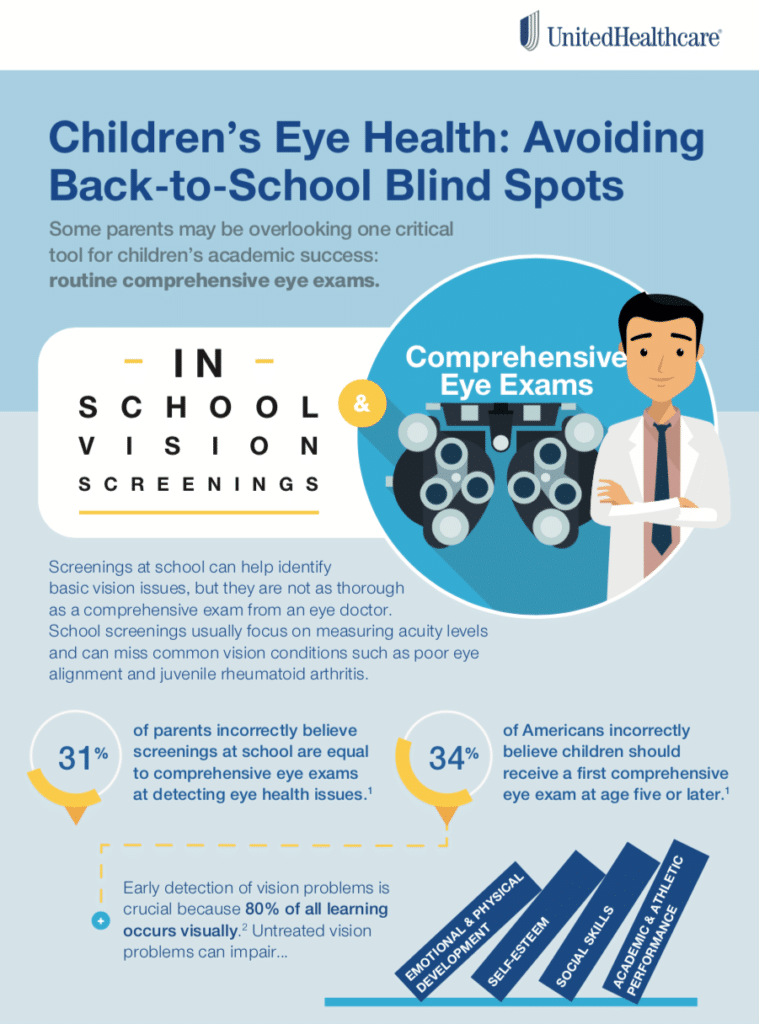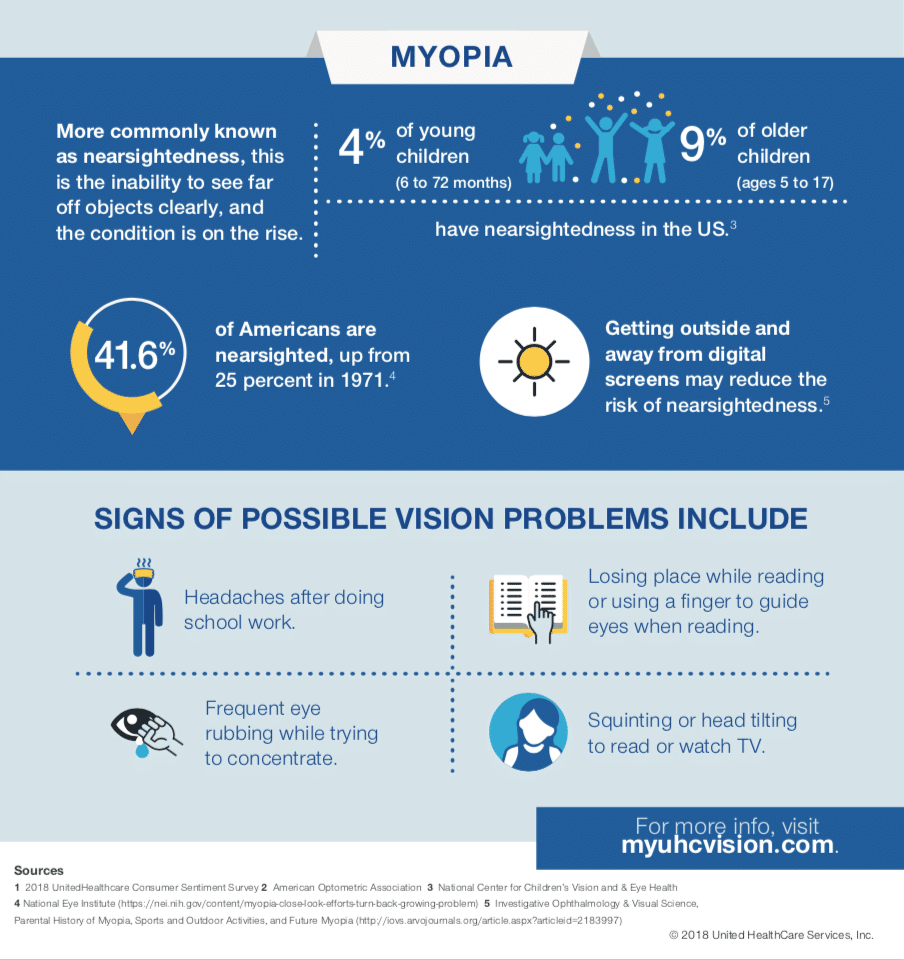It is now back-to-school season and Children’s Eye Health and Safety Month, an ideal time to get your child’s eyes checked.
I’m partnering with United Healthcare today to share just how important it is to get your child’s vision checked regularly.

I asked my then 9-year-old son to tell me how much time was left on the oven timer and he told me he couldn’t see it from just about 20 feet away. I said “What? You can’t see that?” He replied, “You can??”
Wow! I was shocked to find out that he had no idea that having fuzzy vision wasn’t normal. We had just had his eyes tested the summer prior, but in that time his vision changed so drastically that he needed glasses.
The eye doctor told us that he wouldn’t be able to pass a drivers test with the vision he now had. WOW! I was shocked but so thankful we caught it before it started to affect his school performance.
And look at him – isn’t he the cutest in glasses? I think so! 
The first time Andrew put on his glasses he was amazed at how well he could see! He could see the leaves on the trees way up high and the oven timer from across the room.
The Importance of Good Eye Health
Good eye health is important, in part because 80 percent of what children learn is through their eyes. The American Optometric Association recommends that a child’s first comprehensive eye exam should occur between 6 months and 12 months, again at age 3 and before entering school at age 5 or 6. However, despite these recommendations, more than one-third of Americans incorrectly believe children should receive a first comprehensive eye exam at age five or later, according to a recent UnitedHealthcare survey.
The inability to see clearly can affect a child’s physical, emotional and social development, which in turn can affect academic and athletic performance and, ultimately, self-esteem. Many times children are unaware and won’t complain if their vision isn’t normal, so it’s important to look for possible signs of vision problems. Also, it’s important to remember that a school’s vision screening is not a substitute for a comprehensive eye exam. Vision screenings at school usually focus on measuring acuity levels and can miss common conditions such as poor eye alignment, focusing problems and farsightedness.
What Are the Signs of Vision Problems?
As you plan back-to-school shopping, class orientation and any needed immunizations, schedule an appointment for your child to receive a comprehensive eye examination, especially if he or she experiences any of the following:
· Difficulty hitting or catching a ball: If your child regularly misses or drops the ball, it’s possible that vision impairment might be affecting hand-eye coordination. This could also be due to a lazy eye, otherwise known as amblyopia. Amblyopia is when one eye is favored over the other, which can affect depth perception, making it difficult to assess objects in front of you.
· Squinting while reading or watching television: Ask your child if the text or screen is blurry or if reading gives them a headache. A “yes” answer could indicate an underlying vision problem.
· Issues watching 3D movies: 3D movies require eyes to work together as a team to process information, so difficulty viewing 3D content can be a sign of underlying vision issues. After watching a 3D movie, look to see if your child feels any discomfort or dizziness, or is unable to process 3D content.
Also, watch for digital eye strain, which is caused by prolonged use of computers, smartphones or tablets, and can cause symptoms such as sore, tired, watery or dry eyes, headache, or sore neck, shoulder or back. Help your child practice healthy vision habits by keeping computer screens at least 30 inches away from their eyes; resting their eyes every 20 minutes; and blinking frequently to avoid dry eyes. Practice the 20/20/20 rule: every 20 minutes, take 20 seconds and look at something 20 feet away.
In addition, a comprehensive eye exam can uncover other health conditions not usually associated with the eyes, including multiple sclerosis, diabetes, high blood pressure, juvenile rheumatoid arthritis, elevated cholesterol and Crohn’s disease.


Right now The UnitedHealthcare Children’s Eye Care Program will help expand access to eye exams and glasses, including:
Enhanced eye care benefit at no additional premium for children with UnitedHealthcare vision coverage, providing plan participants up to age 13 a second covered eye exam and an additional pair of glasses if their vision prescription changes 0.5 diopter or greater.* Because children’s eyesight can change quickly, this enhancement provides important coverage for UnitedHealthcare vision plan participants, leading the industry in pediatric vision care coverage.
Free eye screenings, comprehensive eye exams and glasses donations for children in cities across the country during August and September, providing families with access to eye care during back-to-school season (see details below). Any child identified with a vision issue during these events will receive a free pair of prescription glasses if needed. One in four children have an undiagnosed vision problem that, if left untreated, may result in learning issues, and hinder their academic performance and development.
UnitedHealthcare Events:
-Prevent Blindness Texas will host a vision screening event – with vouchers provided for comprehensive eye exams – in Houston Friday, Aug. 24, from 2 to 6 p.m. at the BakerRipley Leonel Castillo Community Center (2101 South St., Houston, 77009)
-Eye Care 4 Kids will host a comprehensive eye exam event in Phoenix Wednesday, Aug. 29, from 9 a.m. to 1 p.m. at the Alhambra Family Resource Center (6615 N. 39th Ave., Phoenix, 85019).
-Eye Care 4 Kids will host an exam event in Newark, N.J., Saturday, Sept. 8, from 9 a.m. to 1 p.m. at the Boys & Girls Club of Newark (1 Avon Ave., Newark, N.J., 07108).
-Eye Care 4 Kids will host a comprehensive eye exam event in Las Vegas Saturday, Sept. 29, from 10 a.m. to 2 p.m. at the EyeCare4Kids clinic (6150 W. Smoke Ranch Rd., Las Vegas, 89108).
-Prevent Blindness Georgia will host a vision screening event – with vouchers provided for comprehensive eye exams – in Atlanta in September at Sheltering Arms Center, Barack and Michelle Obama Academy (195 Tuskegee St., Atlanta, 30315), date/time TBD.
-Prevent Blindness Wisconsin will host a vision screening event – with vouchers provided for comprehensive eye exams – in Milwaukee in September at St. Augustine Preparatory Academy (2607 S. 5th St., Milwaukee, 53207), date/time TBD.
-Prevent Blindness Illinois will host a vision screening event – with vouchers provided for comprehensive eye exams – in Chicago in September, date/location TBD.
Make an appointment for your child now as part of this year’s back-to-school routine. Together with your child’s eye doctor, you can help make sure your child is ready for school and ready to learn.









It’s good that you point out that poor eye health can negatively affect a child’s academic performance. My son is starting school next year, and I want to take him for an eye exam to make sure he doesn’t have any vision problems. I’m going to search for a good eye doctor to take him to in my area.
I love how you mentioned that 80 percent of what kids learn is through visual learning. This makes seeing the eye doctor a necessity for kids so that they can have perfect eyesight while learning. Thank you for explaining why kids need to go to the eye doctor regularly.
We are so happy that this post was helpful!
-From the All Things Mamma Team